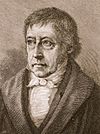Wikipedia:WikiProject Germany/Portal:Baden-Württemberg/Selected biography/9

Georg Wilhelm Friedrich Hegel (/ˈheɪɡəl/; German: [ˈɡeːɔɐ̯k ˈvɪlhɛlm ˈfʁiːdʁɪç ˈheːɡəl]; August 27, 1770 – November 14, 1831) was a German philosopher and an important figure of German idealism. He achieved wide renown in his day and, while primarily influential within the continental tradition of philosophy, has become increasingly influential in the analytic tradition as well. Although he remains a divisive figure, his canonical stature within Western philosophy is universally recognized. Hegel's principal achievement is his development of a distinctive articulation of idealism sometimes termed "absolute idealism", in which the dualisms of, for instance, mind and nature and subject and object are overcome. His philosophy of spirit conceptually integrates psychology, the state, history, art, religion, and philosophy. His account of the master–slave dialectic has been highly influential, especially in 20th-century France.
